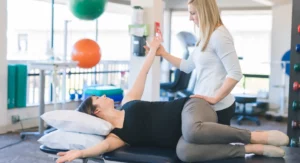© 2025 Boston Sports Medicine. All rights reserved.
Why Personalized Back Injury Physical Therapy in Wilmington Beats Generic Rehab

Generic rehab plans can miss the mark when your back pain has a clear cause—disc irritation, facet joint dysfunction, or muscle imbalance.
Personalized physical therapy addresses your specific back pain generators, work demands, and movement patterns through evidence-based evaluation and targeted treatment, meaning load management tailored to your tolerance, motor control retraining, and progressive strengthening that help prevent flare-ups and speed return to normal activity.
At Boston Sports Medicine’s Wilmington clinic, this level of care is built around your lifestyle, and that changes how recovery looks and feels.
Why Your Back Pain Deserves More Than One-Size-Fits-All Treatment
Sleepless nights, missed work, and fear of re-injury won’t improve with a generic plan that ignores whether your back pain comes from a disc herniation, facet irritation, sacroiliac dysfunction, or nerve root sensitization. Standard programs often skip assessing load tolerance, directional preference, or deep core stability—key factors for lasting recovery.
With the New England Baptist Spine Rehabilitation Program now at Boston Sports Medicine’s Wilmington location, you’ll receive supervised stretching and strengthening designed by Baptist doctors and tailored to your injury.
How Generic Rehab Fails Wilmington Residents with Complex Back Injuries
Quick-fix programs overlook the real drivers of back pain: job demands, age-related disc and joint changes, prior injuries or surgeries, movement patterns, and whether back pain is central, one-sided, radiating, or sacroiliac-related.
Standard templates miss neural tension, skip targeted testing, and may overload or underload tissues. Personalized care instead calibrates exercise, mechanics, and progression to your specific injury profile, helping you recover more efficiently.
What Makes Boston Sports Medicine’s Spine Rehabilitation Program Different?
Through the New England Baptist Hospital (NEBH) network, our clinic delivers spine care shaped by decades of research—covering disc mechanics, nerve root irritation, and motor control.
You’ll be provided a treatment plan grounded in evidence-based loading, mobility work, and neuromuscular retraining matched to your diagnosis. With our help, you’ll set measurable goals and progress through a structured 4 to 8-week program designed to restore function and reduce pain.
The NEBH Network Advantage: Decades of Spine Research at Your Fingertips
With us, you gain access to NEBH’s spine-focused tools—mechanical traction, McKenzie-informed assessments, and real-time movement analysis—proven effective over decades of use.
These systems help identify and treat pain generators in your cervical, thoracic, or lumbar spine, calm nerve irritation, and rebuild stability segment by segment.
State-of-the-Art Rehabilitation Technology in Wilmington
Our Wilmington clinic pairs a newly designed rehab space with technology backed by NEBH research.
Force plates, isokinetic dynamometry, and 3D motion capture quantify spine loading, motor control, and asymmetries. Real-time biofeedback guides training for the lumbar stabilizers, thoracolumbar fascia, and hip abductors—helping you refine movement and recover more efficiently.
This targeted, evidence-driven approach shortens recovery and reduces reinjury risk.
Meet Your Spine Specialist: Kasey Foley, PT, DPT
Kasey Foley, PT, DPT, is a doctorate-level spine specialist who translates NEBH protocols into highly personalized programs. She uses interventions such as McKenzie principles, traction, and graded loading to address your exact pain source—whether disc, facet, or nerve root related. Your plan is adjusted as you progress, with clear milestones to keep recovery on track.
Personalized Programs Designed by Experts
Unlike clinics that rely on generic templates, Boston Sports Medicine’s spine programs are designed and medically guided by Baptist-affiliated doctors with decades of expertise.
These programs are then adapted to target your pain generator—disc, facet, nerve root, or SI joint—using graded loading, motor control retraining, and traction when appropriate. Outcomes are tracked, and progression is tailored to meet your sport, work, or lifestyle demands.
Proven Results: Why Personalized Back Pain Treatment Works Better
When your plan is built for your specific pain generator—whether facet irritation, discogenic pain, or myofascial trigger points—you recover faster and with fewer setbacks.
Research shows individualized PT leads to higher success rates, quicker return to function, and lower re-injury risk compared to standard programs.
Benefits of Individualized Treatment
We measure recovery with objective tools such as inclinometry for lumbar range of motion, handheld dynamometry for trunk strength, and pressure-mapped gait analysis.
These metrics are paired with validated outcomes like the Oswestry Disability Index to track stiffness, motor control, and load tolerance. The data guides plan adjustments, helping you regain mobility, core endurance, and functional capacity more reliably than generic protocols.
Measuring Your Progress with Advanced Assessment Tools
At Boston Sports Medicine, progress is tracked with individualized metrics—not generic benchmarks. We measure lumbar range of motion, paraspinal strength, neural tension, and movement quality, adjusting your plan in real time.
- Objective force and motion testing
- Functional tasks (lift, carry, hinge) under supervision
- Patient-reported outcomes tied to your personal goals
Who Benefits Most from Back Injury Rehabilitation?
Boston Sports Medicine’s spine programs are best for people managing chronic conditions such as lumbar disc herniation, facet arthropathy, spinal stenosis, or sacroiliac dysfunction—particularly when targeted loading and progressive activity are required.
Your PT identifies pain drivers—nerve irritation, myofascial trigger points, joint stiffness, or motor control deficits—and matches them with evidence-based interventions like McKenzie directional preference, core endurance, hip–thoracic mobility, and neuromuscular re-education. Plans are tailored for office workers, healthcare professionals, and active seniors to reduce pain, restore function, and prevent recurrence.
Chronic Spine Conditions That Respond to Individualized Treatment
Post-surgical patients, especially those with multi-level fusions or decompressions, need rehab that respects tissue healing, protects hardware, and restores stability. Programs target deep stabilizers like the multifidus and transverse abdominis, improve neural mobility, and retrain gait while monitoring pain, swelling, and nerve function.
For those whose prior conservative care hasn’t worked, individualized strategies—including mechanical traction, McKenzie-based extension or flexion bias, and aquatic therapy—can restore function and reduce ongoing cervical, thoracic, or lumbar pain.
Post-Surgical Recovery and Complex Multi-Level Cases
Complex spine cases require more than symptom-focused treatment. Boston Sports Medicine integrates tissue healing timelines, neural mobility, motor control, and graded loading to protect fused segments, optimize adjacent mechanics, and ease nerve sensitivity.
- Progressive loading that respects surgical precautions
- Neural mobilization to reduce radicular irritability
- Motor control retraining to restore lumbar-pelvic stability
Your Journey Through Boston Sports Medicine’s Treatment Process
Your care starts with a thorough evaluation that maps pain to specific spinal structures, movement patterns, and aggravating loads. We use objective measures—such as range-of-motion testing, strength assessments, and neurodynamic screening—to guide the process.
From there, your licensed PT team creates a plan that aligns with your goals, recovery timeline, and activity demands. You’ll know your session frequency, expected milestones, and how we’ll adapt treatment based on your progress.
Comprehensive Initial Evaluation: Understanding Your Unique Pain Story
Our physical therapists begin by listening to your “pain story”—when it started, what aggravates it, and how it impacts work, sport, or caregiving. Then we assess tissue and joint irritability, nerve health, and your tolerance for load.
This process helps us find the true source of your pain—whether it’s discogenic, facet-related, or SI joint dysfunction—so we can treat the cause, not just the symptoms.
Collaborative Treatment Planning with Your Expert Team
After the evaluation, we’ll set measurable goals with you and build a plan that fits your lifestyle. We translate your pain mechanisms—disc, facet, sacroiliac, or myofascial—into targeted strategies like spinal stabilization, hip hinge retraining, graded exposure, or aquatic therapy.
Together, we’ll determine session frequency, loading parameters, and progressions, integrating manual therapy, McKenzie principles, and neuromuscular drills. With shared decision-making, every adjustment is transparent, every outcome tracked, and your rehab stays aligned with your work, sport, or daily demands.
Beyond Recovery: Workplace Safety and Long-Term Back Health Strategies
Maintaining a healthy spine at work starts with good posture, proper load handling, and neutral joint positioning. Boston Sports Medicine tailors strategies to your job—whether you stand for hours in a lab or perform repetitive lifts on a construction site—using ergonomic assessments, graded return-to-work plans, and targeted core and hip strengthening.
You’ll also learn simple cues—hinging at the hips, engaging deep abdominals, and pacing tasks—to reduce spinal stress and lower your risk of reinjury.
Workplace Ergonomics and Injury Prevention for Professionals
Long-term back health depends on how you move, lift, and work daily. For office staff, healthcare providers, and tradespeople, we provide job-specific coaching to keep mechanics safe and protect your recovery.
- Set your workstation: Screen at eye level, elbows around 90°, feet flat; alternate sitting and standing every 30 to 45 minutes.
- Lift smart: Brace your core, exhale on effort, keep loads close, pivot with your feet rather than twisting.
- Task-train: Take micro-breaks, use hip-dominant squats, and coordinate team assists for heavier lifts.
Taking Action: Your Next Steps to Personalized Back Pain Relief
We’ll begin with a comprehensive evaluation to pinpoint the source of your symptoms—disc, facet, nerve, or soft tissue—and assess mobility, strength, and movement patterns.
Our Boston Sports Medicine team will review any imaging, rule out red flags, confirm a working diagnosis, and set goals that fit your activities, work demands, and schedule. Book online, verify insurance, and select an appointment time that works for you.
Getting Started: Schedule Your Comprehensive Evaluation Today
Ready for lasting back pain relief? Schedule your evaluation at Boston Sports Medicine.
Book online or call during business hours. Bring imaging (MRI/X-ray), a medication list, training or work shoes, and any prior rehab notes.
Expect a 60 to 75-minute assessment of lumbar mobility, nerve tension, core endurance, gait, and load tolerance.
- Online, phone, or in-person booking with clear directions
- What to bring: ID, insurance card, imaging, medication list, athletic shoes
- What to expect: objective testing, goal setting, and same-day starter exercises
Questions? Contact our Wilmington clinic—your plan will be individualized, evidence-based, and focused on restoring movement and reducing pain.
Frequently Asked Questions:
How Long Does Personalized Back Injury Physical Therapy Take in Wilmington?
At Boston Sports Medicine, back injury rehabilitation typically lasts 4 to 8 weeks, with sessions scheduled based on your specific condition. Each plan targets the underlying causes of pain through manual therapy, corrective exercise, and functional movement training.
Progress is monitored regularly, allowing adjustments that help you regain strength, mobility, and confidence safely.
What Makes Boston Sports Medicine Different From Other Physical Therapy Clinics?
Our approach focuses on individualized programs informed by evidence-based research and clinical experience, not cookie-cutter templates.
Care is delivered by highly trained specialists who address the root causes of injury using manual therapy, rehabilitation exercises, and functional training. This ensures targeted support for chronic back pain, sports injuries, or post-surgical recovery, with measurable outcomes.
Can You Help If I’ve Tried Physical Therapy Before Without Success?
Yes. Boston Sports Medicine designs programs for patients who haven’t improved with prior PT. We assess movement patterns, posture, and biomechanical issues that standard therapy may have missed.
By combining targeted manual therapy, functional exercises, and personalized progression plans, we address overlooked areas to provide meaningful improvement and lasting relief.
Conclusion
You deserve care that targets your exact pain generators—not a generic plan.
Boston Sports Medicine in Wilmington provides a precise evaluation of your spine, hips, core, and movement patterns, followed by a plan that safely loads tissue, restores motor control, and builds resilience for work, sport, and daily life. Evidence shows that individualized exercise and education reduce pain, disability, and recurrence.
Schedule your comprehensive assessment today to start a personalized path toward stronger mechanics, fewer flare-ups, and lasting back health.
Also Read:
Get Back on Your Feet with Targeted Ankle PT in Wilmington
Knee Replacement PT in Wilmington That Pushes Past “Good Enough”
From Rotator Cuff Rehab to Peak Performance: Shoulder PT in Wilmington
Injury Isn’t the Endgame: Athlete PT in Wilmington That Gets You Back in Play
